Making Magic Happen
ArtandSeek.net March 29, 2018 24“Good evening!”
The first thing Trigg Watson does at the start of his show is encourage his audience to drink up – a little more wine always helps a magic act go over. Besides, his show is at the Checkered Past Wine Pub, and it’s good to push the sales. Then Watson asks how many people have seen a magician before, at a kid’s birthday party, on TV. Show of hands, no surprise, most of us have.
“So you clearly already know what to expect,” he says. And the cheesy stadium rock tune, ‘The Final Countdown’ promptly kicks in. Watson starts running through various hokey moves, posing with playing cards and handkerchiefs and then — ding! Yep. He pulls a rabbit from a hat. Obviously, a stuffed toy rabbit, but our expectations having been mockingly met, the audience cheers and claps.
Instead of all that kind of magic, Watson announces, “I want you all to experience” – and now he’s making the hat operate more like a portal to another dimension — “magic like you’ve never seen magic before!”
In the professional magic world, this is known as ‘the pledge’ — the claim for what will follow, setting up expectations. But pledges are normally along the lines of ‘I’ll saw my lovely assistant in half.” They’re the immediate intro for an illusion, not an entire stage act. Watson’s pledge is pretty grand for a 28-year-old SMU grad standing on a tiny, temporary stage in a wine bar in front of 40 people. And the fact is, what follows are often adaptations of classic, even pretty familiar sleight of hand tricks (the cup and ball becomes pretty much ‘the coat pocket and ball’).
But what Watson is doing is making fun of the dustier cliches of magic. In the process, he can pull off something additional, something a little different, something we weren’t expecting. He isn’t just saying ‘abracadabra’ while wearing an opera cape. He often employs everyday electronic gadgets like cellphones or GoPro cameras, which allow him to widescreen the close-up details of his parlor tricks with cards.
But the gizmos also allow him to re-frame his act as not such a stage-y, old-timey creation.
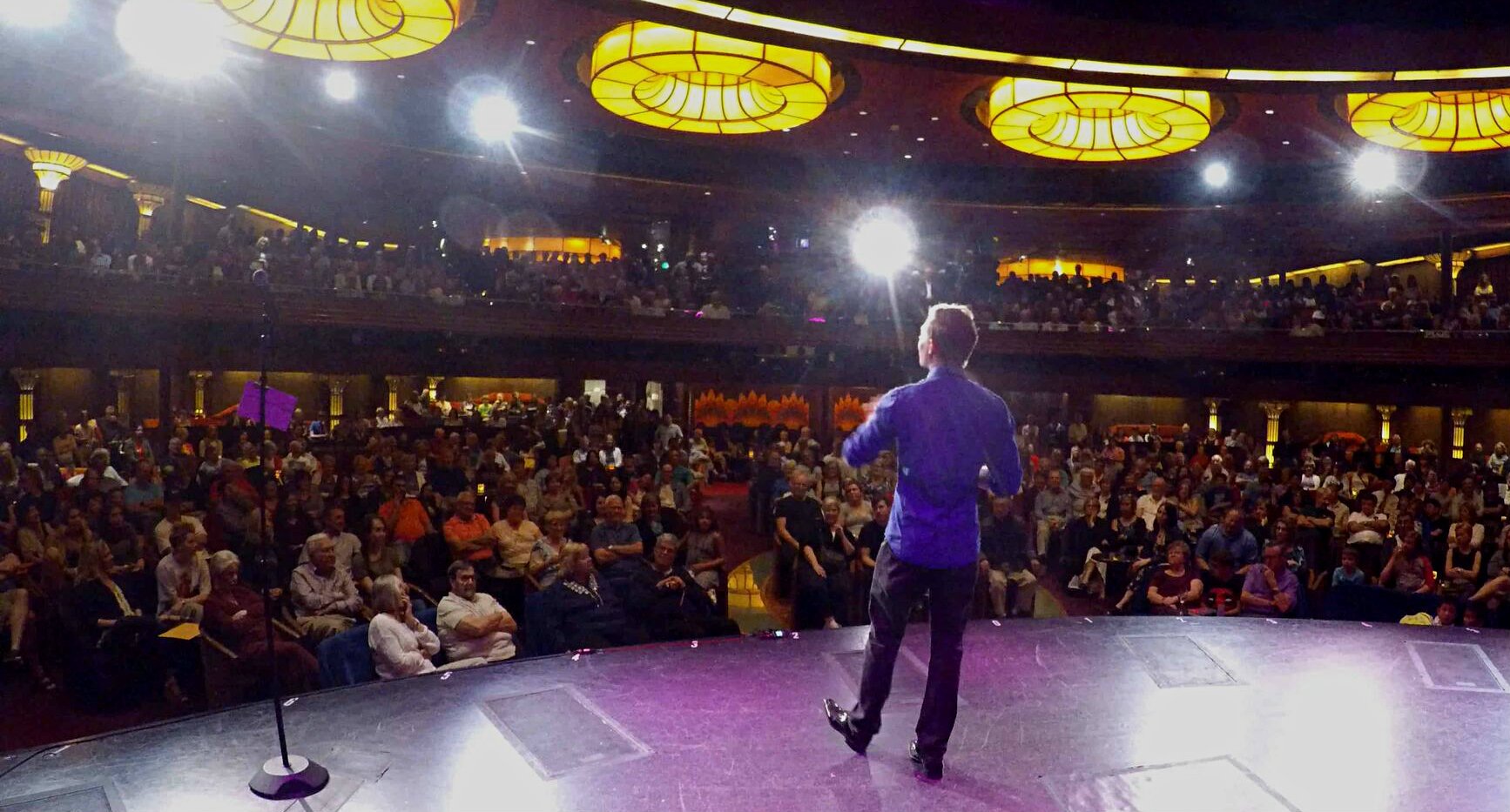
Watson on stage during one of his cruise ship performances.
“I think magic is always strongest when the magician is creating amazement with the world that we live in,” he says. In fact, Watson argues, magic shouldn’t seem so instantly backward-looking. Typically, magicians have tried to stay one step ahead of the public when it comes to exploiting new technologies — the way film pioneer Georges Melies bought an early projector precisely to use for stage illusions in the Paris theater where he performed his magic act. But a lot of magic’s visuals and rituals got stuck precisely then — in the age of crystal balls and conjuring spells. And that’s what most of us still think of when we hear ‘magician.’ Rabbit, meet hat.
“You know, the magician pulling a rabbit from a top hat,” Watson says. “That illusion used to make sense, it actually was very contemporary, because in the Victorian era, a magician would borrow a top hat because that’s what the gentlemen were wearing at the time in the theater, and then he’d produce a rabbit. What an incredible illusion from a borrowed hat.”
Gentlemen don’t wear top hats much anymore — if you hadn’t noticed — so Watson is more likely to borrow a cellphone for a trick. He’s like a techno-nerd magician for millennials. He’ll use his iPad to materialize 3D objects — and then make it cease to be an IPad. He’ll pull a nine-foot ladder out of his laptop.
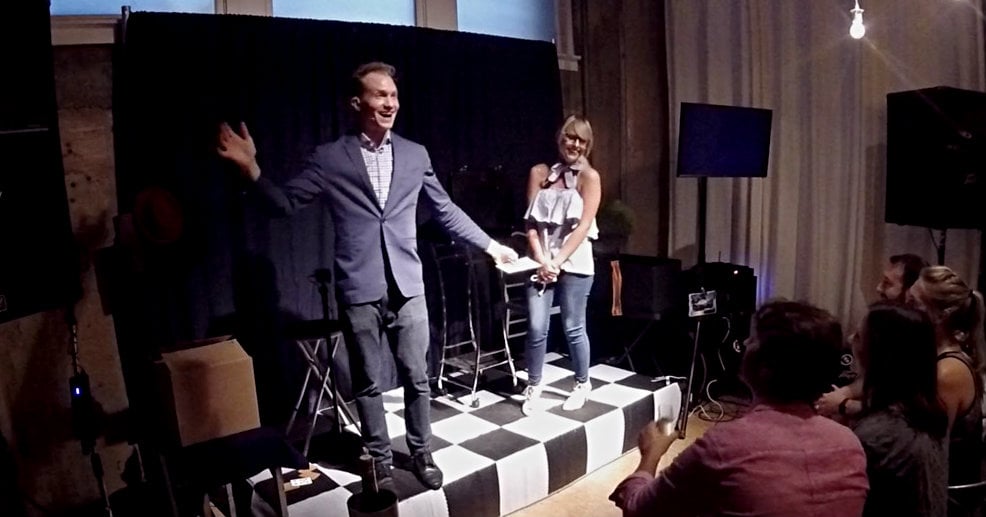
Performing at the Checkered Past Wine Pub.
At the same time, Watson’s other props can look like he got them on discount at Wal-Mart. Which he has sometimes. When airlines have lost his luggage, he’s literally found a nearby Wal-Mart or Home Depot and reconstituted his show. He uses cardboard signs hand-lettered with a felt-tip marker. His ‘time machine’ includes battery cables and a metal mixing bowl. Even with the hi-tech stuff, his overall act has this funky, amusing, backyard kidshow feel.
“I’ve always had this aversion to props that just look like they came out of a magic shop,” Watson says. They’re automatically suspicious, he says. They signal to an audience they’re not ordinary, that this box covered in ‘mystic Chinese symbols’ was built with a convenient, hidden pocket in it. It was specifically designed so I could fool you. So was this jacket. So was this fancy table.
In the end, what’s more surprising to witness: magic popping out of a wizard’s ‘ancient, Egyptian’ trunk or magic popping out of a paper bag?
All of this stuff is masterminded by a grinning redhead who looks like Doogie Howser trying to sell you a time share. Watson’s 28 years old but could easily pass for 20, and his boyish eagerness powers his shows. You know he’s having fun.
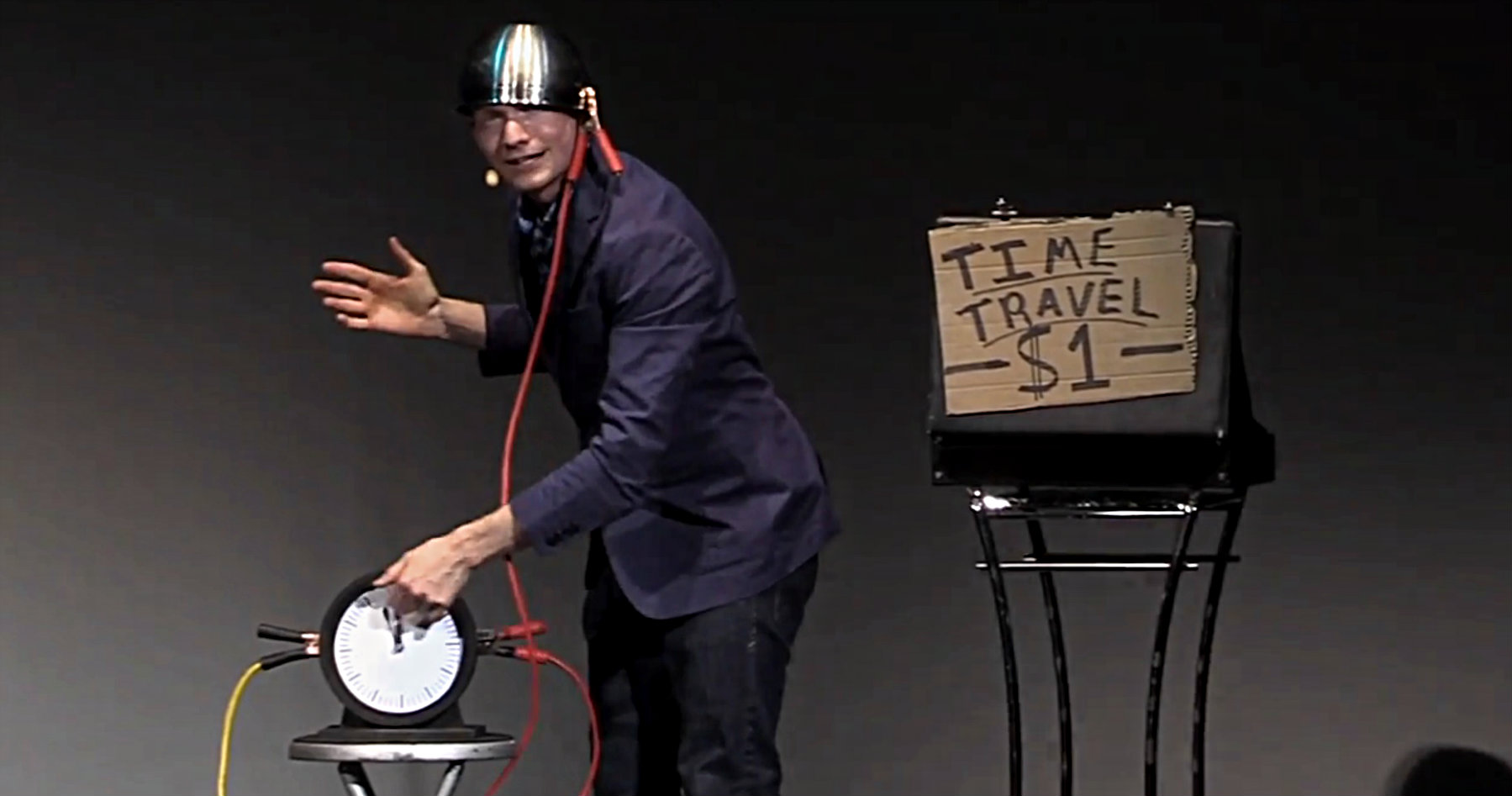
Time travel made easy and cheap. Trust me, I’ve rehearsed this.
Watson’s been fascinated with magic since he was 4. His family moved to America from Australia when he was 11 – and yes, Trigg is his real name. He got degrees in both theater AND business from SMU — back when that wasn’t a standard program. “That would have made it a whole lot easier for me,” he says, “with a whole lot less stress because I was constantly running between the business school and the theater school.”
“But I’m very grateful for it. It pushed me in all kind of ways. I’m very grateful to the theater school because it stretched me as a magician, completely changed the way I saw myself as a magician. And having the business degree on the resume has been useful, too.”
In fact, he wasn’t completely certain he should go-for-broke as a full-time magician, so after graduation, he worked for a year and a half at Deloitte as a business technology consultant: Which “could actually mean anything. In this case, it meant I spent a lot of time in Excel and PowerPoint.” But the business school thinking certainly helped: When he decided to leave Deloitte, he’d made plenty of contacts for future corporate events.
Nowadays, when he’s not entertaining on cruise ships or touring or performing in the Cedars, Watson spends his time obsessively crafting new tricks in his apartment. It’s crammed with tools and props and travel cases and digital equipment. It can take him more than a year to perfect a new illusion, he says.
“I love that as a magician I get to have an idea that is seemingly impossible and then figuring out a way to make it seemingly possible on stage,” he says. “It uses all the different parts of my brain. Obviously, there’s months of practicing the sleight of hand or tweaking the prop if there’s something mechanical involved. But so much more time is spent on ‘How am I going to make people care about this?’
For that, he turns to his theater background. Most magic acts are just ‘I fooled you!’ followed by ‘I fooled you again!’ It’s the magician, always having the advantage, always ‘winning.’ So there’s no drama. What Watson does is add some humor and some tension by simply, unexpectedly — sometimes screwing up.
The first time that happened, says Cooper — a medical student from San Antonio who’d only identify himself as Cooper — “the first time, I was like, ‘Oh, he messed up.‘ The way he starts out acting like he’s not very good. You catch on. You know, ‘I know it’s part of the show but it definitely adds to it.”
Watson has even structured whole sections of his act around his screw-ups, so two or three tricks will unfold from a single mistake. This suits his affable personality. He’s not the all-knowing wizard; he’s more the dopey magician’s assistant who’s lost control of all the spells and rituals.
For Watson, performing magic doesn’t make him feel superior, a con man and trickster. I know something you don’t know! Quite the opposite. He sees it as a form of honesty. People pay him, he says, because he offers them wonder.
“We adults, we have the world figured out,” he says. “There’s not a lot of things that cause us to stop, to put us in a state of awe or amazement, to experience mystery. So for me, magic is a great tool that reminds us that we don’t have everything figured out, that there will always be things that lie beyond our comprehension.”
After all, no one believes Watson’s silly, little time machine actually works.
But he’ll make you wonder how it did.
I know you saw your first magic show at four and became fascinated by it. But when did you say, ‘This isn’t just something fun to play with. This is my career’?
By college, a part of me could see myself doing magic as a career, but there was another side of me that wasn’t really sure yet. In school, I loved all kinds of stuff. I played violin, I did art, I took theater classes. I was kind of a jack of all trades in school, master of none. So I wasn’t really ready to commit to pursuing magic as a career. But I certainly saw that as a possibility, and I did choose majors that lined up well with working in magic. I did a double major, I ended up with a BFA and a BBA, two separate degrees — in theater and business.
Which I like to consider ‘show business.’ That shows a more unified, thought-out approach than I actually had.
But theater and business or art and business – that’s a specialty at SMU’s Meadows School.
Yeah, now. Since I’ve graduated, there’s an arts entrepreneurship major. That wasn’t available at the time. That would have made it a whole lot easier for me, with a whole lot less stress because I was constantly running between the business school and the theater school. So I was taking 19 to 22 hours a semester, it was quite a load.
But I’m very grateful for it. It pushed me in all kind of ways. I’m very grateful to the theater school because it stretched me as a magician, completely changed the way I saw myself as a magician. And having the business degree on the resume has been useful, too.
So when did you make the defining career choice: ‘I’m a magician’?
I think I had decided magic was at the very least going to be a side career in college. I knew regardless of whatever jobs I had, I’d be performing magic. Even then, magic was really the only job I’d had, other than a brief summer in high school as a life guard, bored to tears, knowing that I could be touring summer camps and libraries doing my magic shows and making more money in a single hour than I would make in a whole afternoon as a life guard.
But when I graduated from college, I felt that real fork in the road. I knew that I had an option. I could pursue a more traditional business job. I was really interested in business consulting at the time. Saw it as an opportunity to get experience on a project-to-project basis, get to travel a lot. I saw that as one route and I’d do magic on the side. The other option was to commit to being a starving artist and just throw myself into magic.
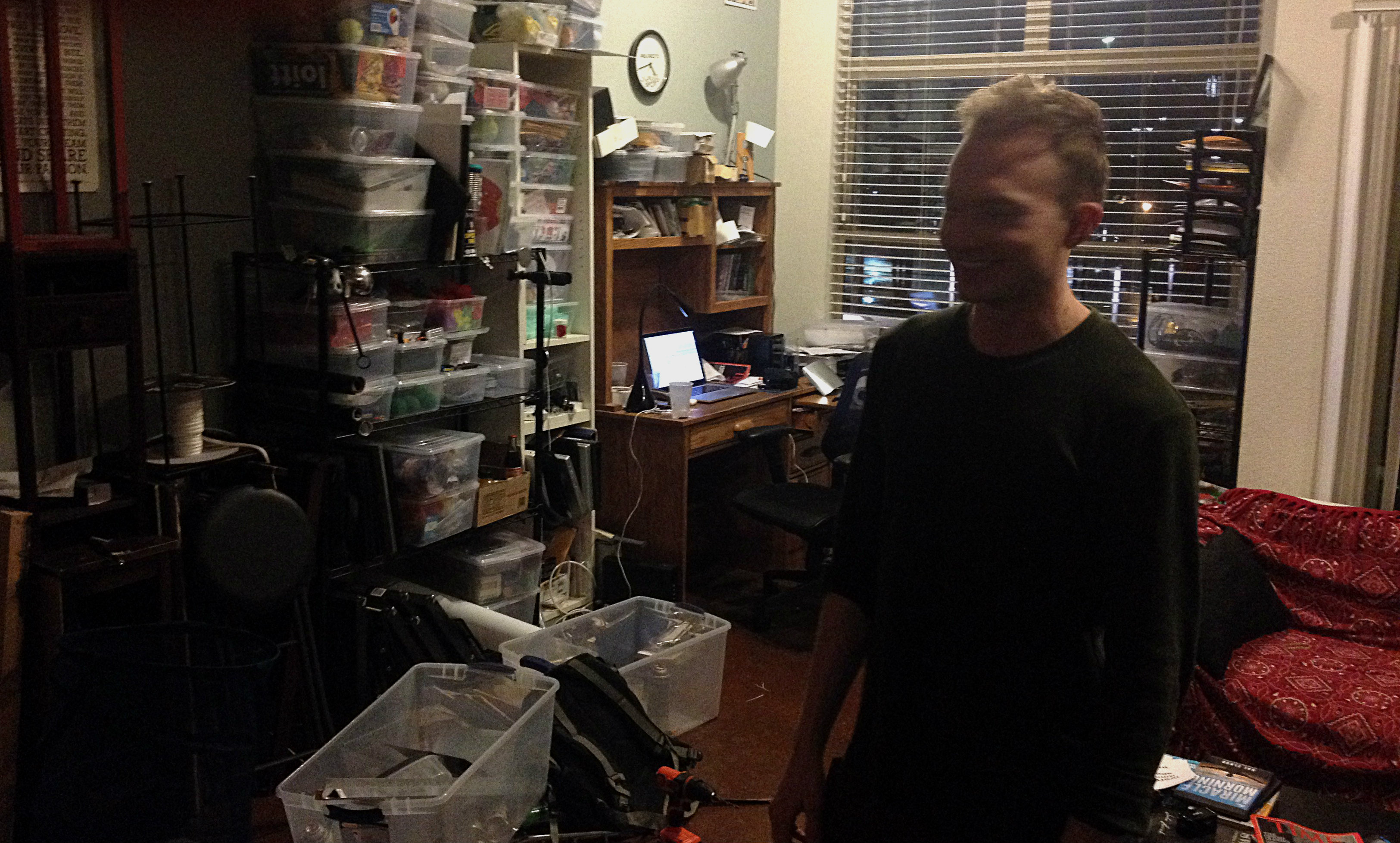
Where the magic happens: Watson in his apartment/workshop.
So I thought, ‘It’s always easier to get the day job right out of college and then quit.’ I could do that rather than go be the starving artist and then a year later be depressed that things weren’t going the way I wanted and then freak out and go back and get my MBA. And that would be the end of my artistic career.
So I went with the safer option. I worked with Deloitte [the accounting consulting firm] in business technology consulting for two and a half years. ‘Business technology consulting’ could actually mean anything. In this case, it meant I spent a lot of time in Excel and PowerPoint.
And I actually had a great time for two and a half years, got a lot of experience working in the corporate environment, which has been very beneficial for my performing career because a lot of bookings outside of my theater shows and cruise ships are corporate events, and my biggest client has been Deloitte.
In the end, it took me longer to admit I was a full-time magician than it did many of my peers. They seem to have known it was going to be magic or nothing else pretty early on.
You’ve talked about the awe and wonder magic can inspire. But surely, doing the same illusion over and over, knowing the mechanics of how the trick works, that kind of awe and wonder must wear off, even if you get ‘ooohs’ and ‘ahhs.’ What else keeps you going?
Well, one thing that keeps bringing me back to develop new illusions, one of the other things I love about magic, is that it encapsulates so many different disciplines for me. Some days, I’m wearing the business hat, where I’m having to market my show. Other days, I’m wearing an engineering hat, I’m having to develop a new illusion, prototyping new props, working on the workshop. Other days, I’m more of an actor and I’m scriptwriting. It challenges all parts of the brain.
And that’s what I love about being a solo entertainer. I get to control all those different aspects of the craft.
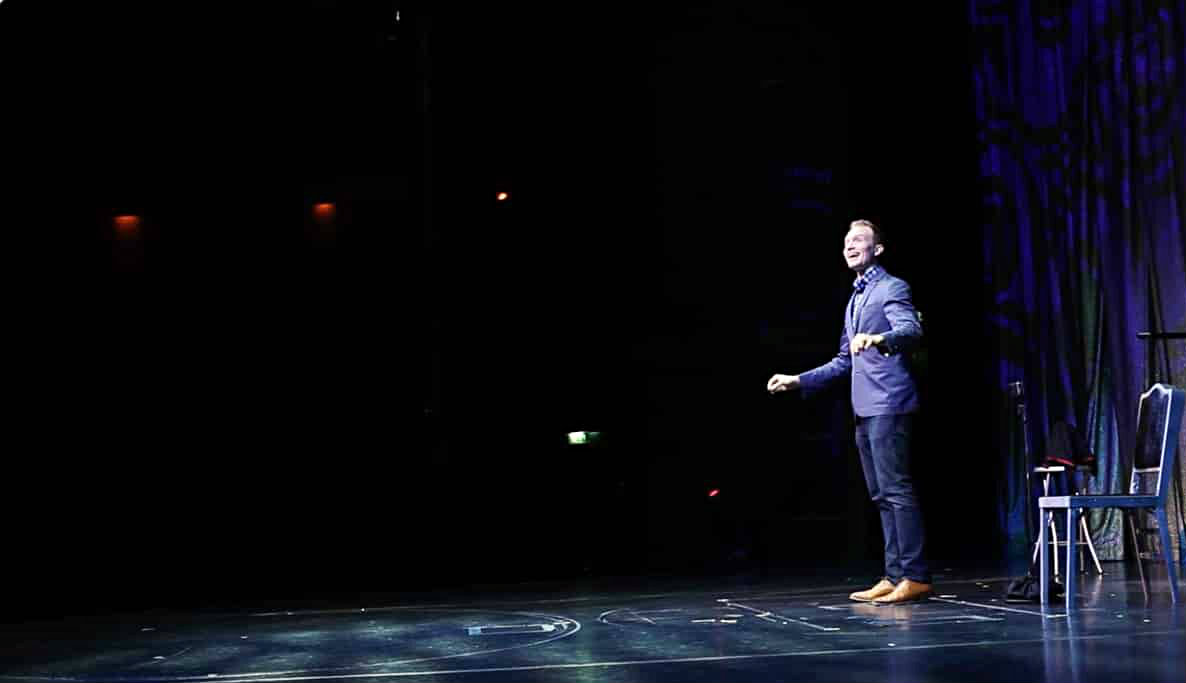
How has living and working in North Texas worked out for you? And why haven’t you moved to New York or LA or even Las Vegas, where there would seem to be more professional opportunities. Especially considering how many cruise ships you work on, living on either coast would seem to make sense.
One, because I travel so much, Dallas-Fort Worth is a great hub. I can get to anywhere in the country in 3-4 hours, and get to a lot of international destinations in one or two flights, and that’s very beneficial, whether I’m working corporate events or have to get to LA or Miami or Hong Kong, wherever the cruise ship is leaving. [During this phone interview, Watson was in Shanghai on his way back to the US.]
Two, if I were to move to New York or LA, it’d actually be harder for me to develop new material and to find work. They’re more saturated markets. There’s a big, commercial industry in both cities, a lot of actors and magicians in those cities. I just know I’d struggle more to make my own mark.
Something I love about Dallas is that it’s a new and growing city. So having local venues to perform in where there’s not as much competition really allows me to concentrate on developing material, working on my shows –
— you have a chance to see if this or that routine fails. And while you’re learning that, it won’t kill your career.
Absolutely! There’s not as many eyes on me, judging me while I experiment with things. I like that about Dallas, I can work on my own and then when I’m ready with new material, I can share it. Interestingly, living in Dallas hasn’t really stopped me from getting considered for different television projects. With the internet, people have shared videos, people hear about me, so it hasn’t really been any sort of hindrance so far to getting me to where I want to go.









